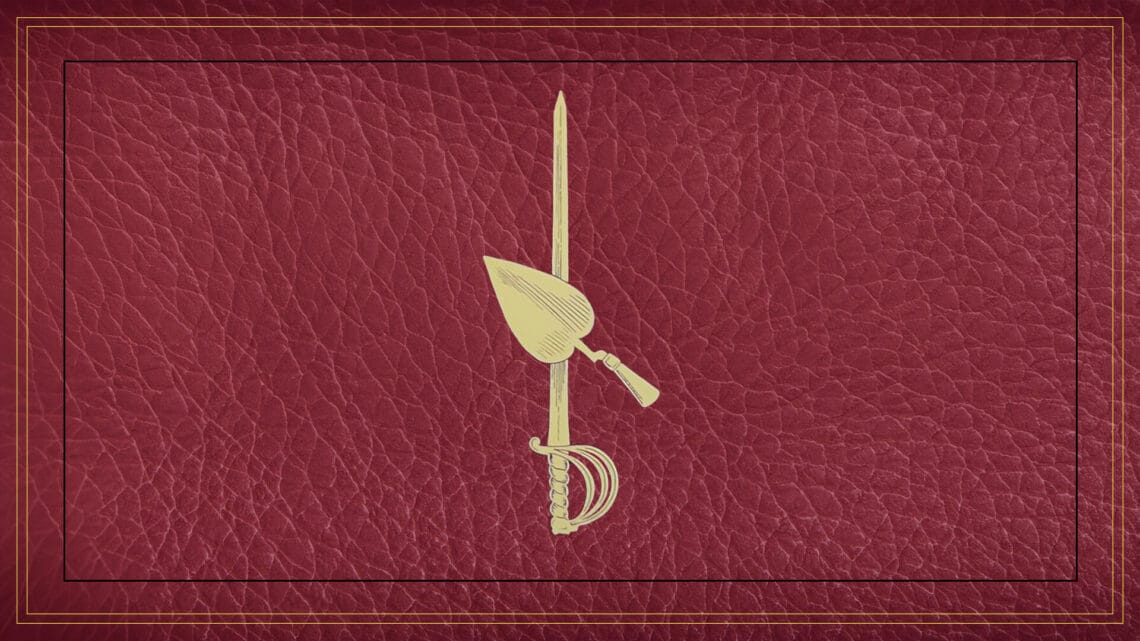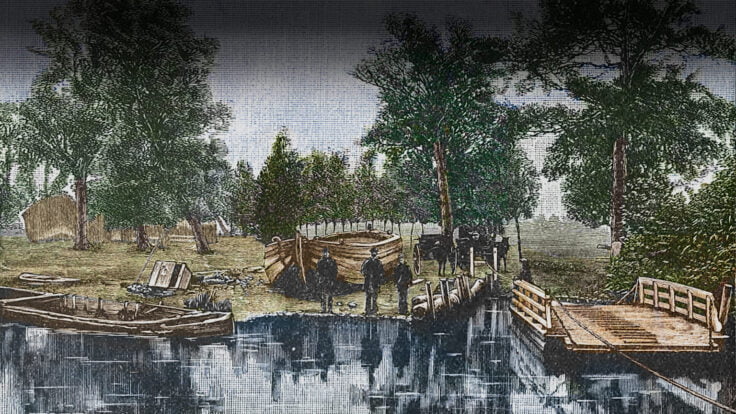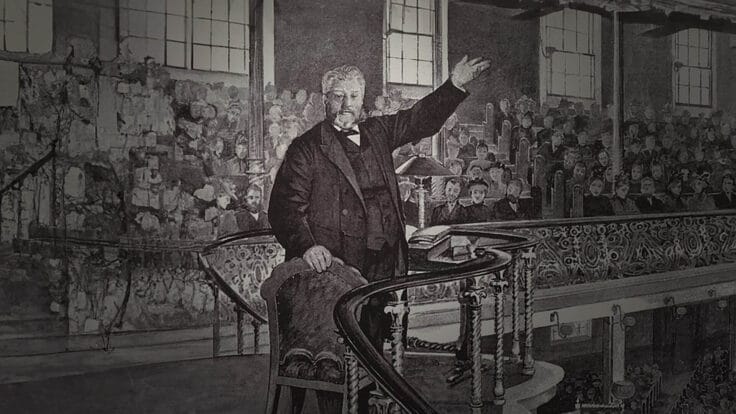In January of 1866, CH Spurgeon published this New Year’s message in The Sword & the Trowel, a magazine which he began in the previous year. In this article, he warns of the ‘unwelcome visitors’—doubts, worldly cares, and temptations—that believers are likely to face in the year ahead. Spurgeon not only identifies these spiritual challenges but also offers practical guidance on how to confront them with faith, prayer, and reliance on God’s promises.

“The bands of the Moabites invaded the land at the coming in of the year.” 2 Kings 13:20.
Scarcely have we had space to praise the God of mercy for sparing us through the past year, before we are beset with new enemies. Unasked, unexpected, and unwelcome guests, pour into the house, while yet our friends are wishing us a happy New Year. A little breathing space would have been delightful; to sit down and sing of faithfulness and truth would have been refreshing; but the trumpet sounds, the foe is mustering, and therefore we must lay aside the dulcimer of peace for the clarion of conflict. Truly is it written, “this is not our rest.”
Who are these Moabites?
These troublers of our peace, whence come they? They were born in the country of Corruption, a land which is full of darkness and crowded with the habitations of cruelty. They feed upon provision made for the flesh, and they are armed from the magazine of unsanctified nature; the Old Adam is their father, sin is their mother, unbelief their nurse, and self their captain.
For number they are legion, and they prowl in bands, each band doing its best to make havoc of every good thing. They break down the carved work of our graces with axes and hammers, they fill up the wells of our comfort, and mar every piece of the good ground of our usefulness with stones.
Doubts of our calling, election, and perseverance, like packs of hounds, hunt for their prey. Suspicions of the love, truth, wisdom, and faithfulness of God, march in troops, devastating the land wherever they obtain an entrance.
Worldly cares, fretfulness, murmuring, and despondency, with fierce looks cast fire upon all the goodly houses of our delight and hope. Temptations of all shapes, but chiefly suggestions of an unbelieving character, barbarously ravage our hearts. Before one has finished his terrible work, another is at hand.
Like the frogs of Egypt, these invaders go up into our bedchamber and disturb our sleep; they leap into our kneading troughs and embitter the bread we eat, and even enter the king’s house and defile our devotions.
Behind our business they entrench themselves, and in our evil hearts they find munitions of war; our increasing families, our health, our trade, our work for God, our unanswered prayers, and above all, our sins, seem all of them to be as ladders by which they scale the ramparts of our soul. Alas, for us, that these Moabites thus cruelly invade the land.
What is their errand?
It is the thief’s business. They come to kill and to destroy. Doubts are ruthless robbers, and spare nothing upon which they can lay their mischievous hands. Unbelief ravins as a wolf; in the morning it devours the prey, and in the evening it divides the spoil. Distrust of the God of providence and grace is cruel as death, and insatiable as the grave.
To suppose that we can ever be profited by harboring such visitors, is as foolish as to dream of carrying coals in our bosom, and escape burning. Doubts spoil our comfort, impede our progress, injure our usefulness, dishonor the Lord, and vex his Spirit.
Faith enriches, suspicion impoverishes; trust fills the garner, fear empties the storehouse; confidence trades with Ophir, mistrust wrecks the vessels; believing feeds the fat kine, but doubts are the lean kine which devour the fat kine. We shall never overcome trouble by fretting, or lighten care by dark forebodings. These bands of the Moabites are enemies, and are bent on ill designs.
How shall we receive them?
The edge of the sword of faith must give them a sharp reception, and the weapons of our holy warfare must all be plied with vigor, to make the land too hot to hold them. Believers in the Lord Jesus, rally your forces around the standard of the cross; unsheathe the invincible weapon of all-prayer; put Captain Credence at the head of the troops, and march vigorously against the band of cares, the host of doubts, the legion of suspicions, and the army of temptations.
No truce or parley may be talked of. To submit tameless even though it were but for an hour would involve the ruin of our joy for many a day, for these foes in a moment perpetrate mischief which years cannot amend.
“Get thee behind me, Satan,” must be our answer to any dark thought of God which may crave a hiding-place in our bosoms. The wonderful dealings of the Lord with his people in ancient times, his faithfulness as proved in our own experience, the immutability of his counsels, the power of his arm, the love of his heart, the veracity of the promise, the prevalence of the precious blood, all these should furnish us with artillery against the Moabitish bands.
God is on our side, why should we fear? He has given us deliverance aforetime, let us rely upon him now. Our hope is in heaven, and our boast in Jesus, and therefore with courage we advance to preserve our borders and expel the foe.
Are there no other visitors?
Did not a host of angels meet Jacob at Mahanaim? Are there not still watchers, and holy ones who have commerce with the heirs of salvation? Is the King himself a stranger to his blood-bought ones? Is there no Melchizedek to refresh conflicting believers with bread and wine? Is there no goodly fellowship of saints on earth, and no noble army of martyrs in heaven?
Let us seek communion with heaven and heavenly things, and fill our house with the friends of Jesus, that there may be no room in our inn to entertain worldly cares.
CH Spurgeon
Let us seek communion with heaven and heavenly things, and fill our house with the friends of Jesus, that there may be no room in our inn to entertain worldly cares. Let us dedicate our days to Christian service among the Lord’s people. To wait upon God is to bless ourselves.
Can we not wish the poor a happy New Year practically by relieving their wants? Can we not visit some sick brother to-day and cheer his lonely bed? Can we not do something for King Jesus by feeding his sheep or lambs? Surely we can find a band of godly workers to unite with, that like those of old who feared the Lord, we may speak often one with another.
While thus engaged the enemy will find less occasion against us, and being in holy employment, we may hope for heavenly protection. If bands of hallowed desires, gracious endeavors, fervent supplications, and devout meditations shall garrison our souls, we need not fear that the bands of the Moabites will invade the land at the coming in of the year.
Can we not invade the enemy’s territories?
There is yet very much land to be possessed. Districts lie unvisited, towns un-evangelized, sinners unsaved. War must rage, then let us be the invaders, and carry the battle into the enemy’s camp.
Oh for one great, energetic, earnest, persevering onslaught all along the line!
England expects every man to do his duty; what does the Church expect? What does our Lord expect and deserve at our hands?
By the love we bear him let us seek to snatch the souls of men from ruin, by telling them of the love of Jesus to sinners. Rouse us, O Lord, at the coming in of the year, and make 1866 to be blessed in the annals of our race.






